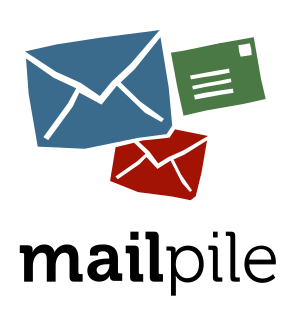Pretty Good Privacy (PGP) is an encryption program that provides cryptographic privacy and authentication for data communication. PGP is used for signing, encrypting, and decrypting texts, e-mails, files, directories, and whole disk partitions and to increase the security of e-mail communications. Phil Zimmermann developed PGP in 1991.

GNU Privacy Guard is a free-software replacement for Symantec's PGP cryptographic software suite, and is compliant with RFC 4880, the IETF standards-track specification of OpenPGP. Modern versions of PGP are interoperable with GnuPG and other OpenPGP-compliant systems.

An email client, email reader or more formally mail user agent (MUA) is a computer program used to access and manage a user's email.

Skype is a telecommunications application that specializes in providing video chat and voice calls between computers, tablets, mobile devices, the Xbox One console, and smartwatches over the Internet. Skype also provides instant messaging services. Users may transmit text, video, audio and images. Skype allows video conference calls.

Google Talk was an instant messaging service that provided both text and voice communication. The instant messaging service was variously referred to colloquially as Gchat, Gtalk, or Gmessage among its users.

Java Anon Proxy (JAP) also known as JonDonym, is a proxy system designed to allow browsing the Web with revocable pseudonymity. It was originally developed as part of a project of the Technische Universität Dresden, the Universität Regensburg and Privacy Commissioner of the state of Schleswig-Holstein. The client-software is written in the Java programming language.
Email privacy is a broad topic dealing with issues of unauthorized access and inspection of electronic mail. This unauthorized access can happen while an email is in transit, as well as when it is stored on email servers or on a user computer. In countries with a constitutional guarantee of the secrecy of correspondence, whether email can be equated with letters and has legal protection from all forms of eavesdropping comes under question because of the very nature of email. This is especially important as relatively more communication occurs via email compared to via postal mail.

Pando was an application which was mainly aimed at sending files which would normally be too large to send via more "conventional" means. It used both peer-to-peer and client-server architectures and was released for Windows and Mac OS X operating systems.
Email encryption is encryption of email messages to protect the content from being read by entities other than the intended recipients. Email encryption may also include authentication.
Silent Circle is an encrypted communications firm based in Washington DC. Silent Circle provides multi-platform secure communication services for mobile devices and desktop. Launched October 16, 2012, the company operates under a subscription business model. The encryption part of the software used is free software/open source and peer-reviewed. For the remaining parts of Silent Phone and Silent Text, the source code is available on GitHub, but under proprietary software licenses.

Upptalk was a proprietary voice-over-IP service and software application that provided mobile phone numbers in the cloud and allows users to call or text any phone for free whether or not the device receiving the calls and texts has the Yuilop application. The service was discontinued in 2017 and even its domain was abandoned.

Tox is a peer-to-peer instant-messaging and video-calling protocol that offers end-to-end encryption. The stated goal of the project is to provide secure yet easily accessible communication for everyone. A reference implementation of the protocol is published as free and open-source software under the terms of the GNU General Public License (GPL) version 3 or later.

Mailpile is a free and open-source email client with the main focus of privacy and usability. It is a webmail client, albeit one run from the user's computer, as a downloaded program launched as a local website.

ProtonMail is an end-to-end encrypted email service founded in 2013 in Geneva, Switzerland by scientists who met at the CERN research facility. ProtonMail uses client-side encryption to protect email content and user data before they are sent to ProtonMail servers, unlike other common email providers such as Gmail and Outlook.com. The service can be accessed through a webmail client, the Tor network, or dedicated iOS and Android apps.

Threema is an end-to-end encrypted instant messaging application for iOS, Android and Windows Phone.
Wire Swiss GmbH is a software company,with headquarters in Zug, Switzerland. Its development centre is in Berlin, Germany. The company is best known for its messaging application called Wire.

Signal is a cross-platform encrypted messaging service developed by the Signal Foundation and Signal Messenger LLC. It uses the Internet to send one-to-one and group messages, which can include files, voice notes, images and videos. Its mobile apps can also make one-to-one voice and video calls, and the Android version can optionally function as an SMS app.

pretty Easy privacy is a pluggable data encryption and verification system, which provides automatic cryptographic key management through a set of libraries for written digital communications. Its main goal is to turn the default in written digital communications towards end-to-end encryption for all users in the most easy way possible and on all channels they use already today, including e-mails, SMS or other types of messages.

Tutanota is an end-to-end encrypted email software and freemium hosted secure email service. Its business model excludes earning money through advertisement relying solely on donations and Premium subscriptions. The motto of the service "einfach.sicher.mailen" means "easy.secure.mailing".
Autocrypt is a cryptographic protocol for email clients aiming to simplify key exchange and enabling encryption. Version 1.0 of the Autocrypt specification was released in December 2017 and makes no attempt to protect against MITM attacks.. It is implemented on top of OpenPGP replacing its complex key management by fully automated unsecured exchange of cryptographic keys between peers.












